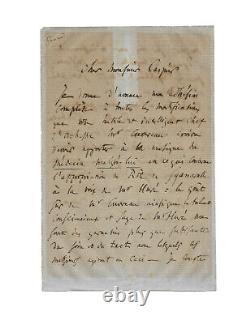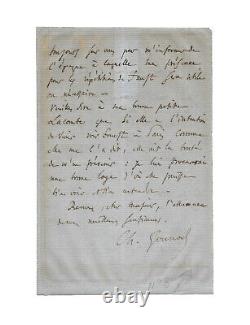
- Homepage
- Author
- Alfred Bruneau (3)
- Auguste Maquet (3)
- Beydts (louis) (4)
- Camille Mauclair (3)
- Charles Monselet (3)
- Chateaubriand (5)
- Colette (3)
- Ernest Daudet (3)
- Eugène Labiche (3)
- Jean Couty (3)
- Jean-léon Gérôme (5)
- Louise Read (4)
- Marcel Proust (5)
- Paul Chabas (4)
- Paul Meurice (3)
- Proust (3)
- Roger Martin Du Gard (4)
- Salomon Reinach (3)
- Sully Prudhomme (7)
- Violette Leduc (4)
- Other (4043)
- Era
- 18th Century (11)
- 1900 To 1960 (63)
- 1930s (4)
- 1960s (5)
- 1970s (7)
- 19th (5)
- 19th Century (49)
- 20th Century (16)
- Beautiful Era (12)
- Belle Epoque (49)
- First Empire (10)
- First World War (4)
- Nineteenth (19)
- Nineteenth Century (11)
- Post-war (23)
- Restoration (17)
- Roaring Twenties (28)
- Second Empire (21)
- Second World War (6)
- World War Ii (9)
- Other (3749)
- Language
- Region
- Subject
- Theme
Charles GOUNOD / Signed autograph letter / Faust / Opera / Music / Goethe




Insolations," with a small, minimal loss in the upper left margin. Important letter regarding the preparations for Le Médecin malgré lui and referencing Faust, his greatest success. "I give my full agreement in advance to all modifications that your skilled and intelligent conductor Mr. Cuiveau deems necessary for the music of Médecin malgré lui concerning the adaptation of the role of Sganarelle to Mr. Cuiveau's sure taste, along with Mr.
Huré's conscientious and wise talent, provides me with more than sufficient guarantees of the care and tact with which these gentlemen will proceed in this matter - I always count on you to inform me of the time when my presence for the rehearsals of Faust will be useful or necessary. Please tell my dear little Lacombe that if she intends to come see Faust in Paris as she told me, she should kindly let me know: I will arrange a good box from which she can see and hear well. Receive, dear sir, the assurance of my best feelings. Faust is an opera in five acts by Charles Gounod, with a libretto by Jules Barbier and Michel Carré, based on the eponymous legend and Goethe's play, created at the Théâtre Lyrique on March 19, 1859.
Gounod's most well-known work, Faust enjoyed great success from the start. It is probably, alongside Georges Bizet's Carmen, the most well-known French opera in the world. It had nearly 200 performances before being revived, with an added ballet, in 1869 at the Opéra Le Peletier, and then at the Opéra Garnier where it reached its... " is probably the wife or daughter of his friend Paul Lacombe, a composer.

